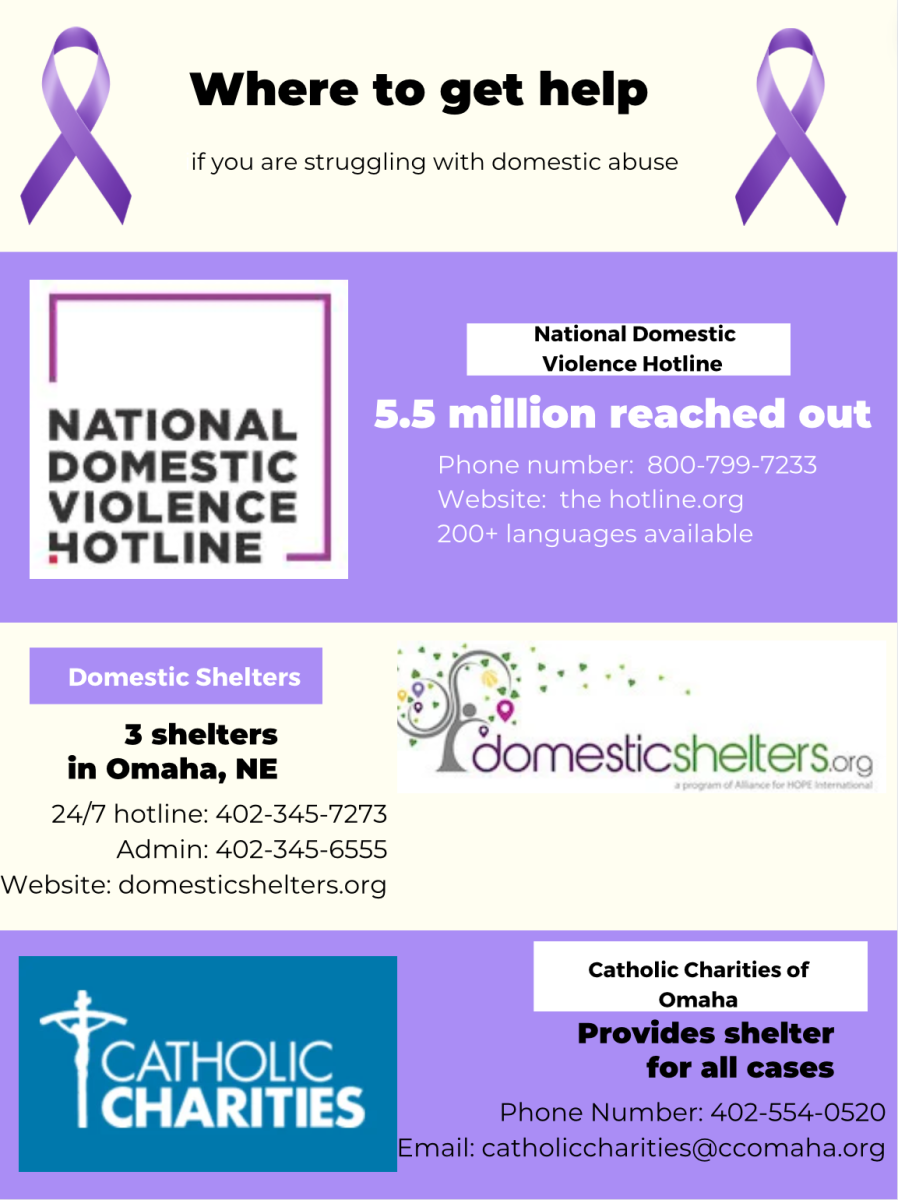*This story mentions domestic abuse, rape, sexual assault, and other topics that may be upsetting to readers. If you are struggling or have been in a domestic abuse relationship before, there are people out there to talk to and hotlines to go to get help. You are not alone.*
According to the United Nations website, domestic abuse can be defined as a pattern of behavior in relationships where a partner tries to gain or maintain power. In some cases, gaining this power can mean physical, sexual, emotional, economic, or psychological actions.
“Family domestic violence is a common problem in the United States, affecting an estimated ten million people (about half the population of New York) every year,” said the National Institutes of Health. Family domestic violence occurs all over the world and is common in the United States.
One place domestic abuse victims can go to is the National Domestic Violence Hotline. This hotline can be reached through phone calls, text messages, or email and is a way to discuss your feelings in a safe space.
Another way to get help if someone has been or is a victim of a domestic abuse relationship is to reach out to a domestic violence counselor.
Jessica Riley is a School Psychologist who has her master’s in Psychology and an Educational Specialist degree. Riley works with individuals and students to help them better their grades and high-school experience.
“Any type of violence towards a partner or a loved one, so it could be physical violence, it could be emotional abuse or even neglect,” said Riley.
Looking at tactics to cope with domestic abuse, Riley focuses on teaching her clients emotion regulation tactics and deep breathing strategies.
“In my work with students, I would help them really try to learn and practice some emotion regulation strategies and some coping strategies to help with the feelings,” said Riley.
Coping methods are a strategy that Riley and many online counselors try to help provide. There are people all around the world suffering in domestic abuse relationships that have not reached out for help as stated by Bonterra Tech.
There is an average of 24 people per minute who are victims of stalking by an intimate partner, physical violence, or rape and three out of ten women and one out of ten men have experienced domestic abuse according to the National Domestic Violence Hotline.
This information goes to show that many people go through domestic abuse or some form of it and many more people go through it that do not feel comfortable to speak about their experience.
“Nearly half (44 percent) of domestic violence cases go unreported,” according to Connections for Abused Women and their Children. This means that 323,840,000 and more cases go unheard of because of non-reported violence.
There are many different ways that people express their feelings and cope with domestic abuse experiences.
According to Domestic Shelters, there are both healthy and unhealthy ways to cope from domestic abuse situations.
A couple of healthy coping methods would be listening to one’s feelings, setting clear physical and emotional boundaries with the people surrounding their life, rebuilding relationships, and forgiving themselves if guilt occurs.
While there are good coping methods, there are also very unhealthy methods such as having a codependent relationship which means latching on to a parent or other family member or friend. This coping method can be dangerous because survivors of domestic abuse may think that they are “all good” because they found someone to fill that void.
Another unhealthy coping method is turning to drugs and alcohol. Orlando Recovery Center’s website stated that over 56 percent
of abused women turn to drugs/substances after they get out of domestic abuse situations. Taking drugs is a coping method that many women and men turn to after being in abusive situations.
While this method is taking away all the problems like trauma from the relationship, it is creating more. According to betterhealth.vic.gov.au, drugs can increase mood swings, insomnia, colds, and create memory issues.
These coping methods are important to know so that the person who went through this abuse knows how to channel their feelings the correct way without damaging their body.
The reward of choosing these healthy coping methods is to feel control of their body, emotions and who they surround themselves with.
Domestic abuse is a severe violence that affects a lot of relationships and to the people in these types of relationships, there are many ways to seek help and cope with the abuse.
If you are struggling with domestic violence or know someone, contact the National Domestic Violence Hotline at 800-799-7233.



